

123. Overview: Cognitive abilities and their importance. What are cognitive abilities and why are they important? What are Cognitive Skills and Why Are They Important? By: Dr.
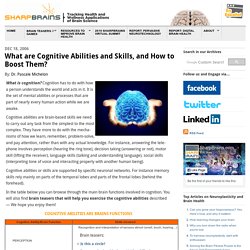
Pascale Michelon What is cognition? Cognition has to do with how a person understands the world and acts in it. It is the set of mental abilities or processes that are part of nearly every human action while we are awake. Cognitive abilities are brain-based skills we need to carry out any task from the simplest to the most complex. Cognitive abilities or skills are supported by specific neuronal networks. In the table below you can browse through the main brain functions involved in cognition. With age, some cognitive abilities tend to decline, especially the so-called executive functions,
Overview: Cognitive Abilities and Aging. Cognitive Declines and Aging. Aging and cognitive abilities. Main article 1: Normal cognitive changes in ageing. Overview: Why stay active? Physical and mental fitness are protective factors. Main Article 2 (physical activity): Effects of physical exercise on prefrontal cortex activity. Main article 3 (physical activity): Working memory in healthy older adults. Main Article 4 (mental activity): Social interaction and cognitive decline. Main Article 5 (mental activity): Social engagement and cognitive function. Safety first! Staying Safe During Exercise & Physical Activity for older adults. Almost anyone, at any age, can exercise safely and get meaningful benefits.
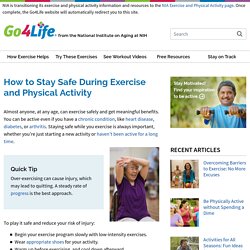
You can be active even if you have a chronic condition, like heart disease, diabetes, or arthritis. Staying safe while you exercise is always important, whether you’re just starting a new activity or haven’t been active for a long time. To play it safe and reduce your risk of injury: Begin your exercise program slowly with low-intensity exercises.Wear appropriate shoes for your activity.Warm up before exercising, and cool down afterward.Pay attention to your surroundings when exercising outdoors.Drink water before, during, and after your workout session, even if you don’t feel thirsty.Dress appropriately for the temperature outdoors, or opt for an indoor activity if it’s very hot or cold.If you have specific health conditions, discuss your exercise and physical activity plan with your health care provider.
Endurance. Staying physically active at home. 7-Minute Yoga Workout for Older Adults. Seated Exercises for Older Adults. Simple Workout for Older Adults. Staying physically active outdoors. Physical Activity for Older Adults. Significant health benefits are seen in adults aged 65 years and older who participate in regular physical activity.
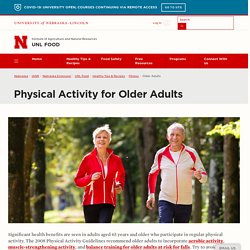
The 2008 Physical Activity Guidelines recommend older adults to incorporate aerobic activity, muscle-strengthening activity, and balance training for older adults at risk for falls. Try to avoid inactivity because some health benefits can occur with any amount of physical activity gain. Older adults need to evaluate their level of fitness before determining their level of effort for physical activity. Chronic conditions need to be taken into consideration since they may affect their ability to do regular physical activity safely. Inactive Older Adults Remember to start slowly!
Talk to your doctor if you have a chronic health condition (such as heart disease, arthritis, or diabetes) or symptoms (such as chest pain or pressure, dizziness, or joint pain) before starting a physical activity program. Staying mentally active. Sudoku online - for Seniors. Word search puzzle. Hobby ideas for older adults. Having a hobby can help you establish new connections, improve your mood, and enhance your levels of coping with stress.
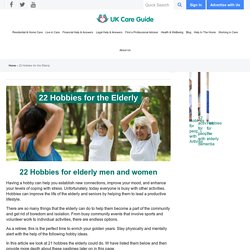
Unfortunately, today everyone is busy with other activities. Hobbies can improve the life of the elderly and seniors by helping them to lead a productive lifestyle. There are so many things that the elderly can do to help them become a part of the community and get rid of boredom and isolation. From busy community events that involve sports and volunteer work to individual activities, there are endless options.
As a retiree, this is the perfect time to enrich your golden years. In this article we look at 21 hobbies the elderly could do. 22 Hobbies for the elderly Focus on HealthArtDancingGolfingVolunteeringSportsFitness activitiesGardeningGamesCaring for a petWritingCookingPuzzlesBook readingModel buildingAntiquingGeneaologyBird watchingBakingTravellingCommunity GroupsAdult Learning 1 – Focus on Health As people age, health becomes a significant part of life. NLB eBooks. Joining the community in staying active.
Activities and courses for older adults. Senior Citizens' Executive Committees PA Senior Citizens’ Executive Committees (SCECs) is the largest seniors’ network in Singapore.
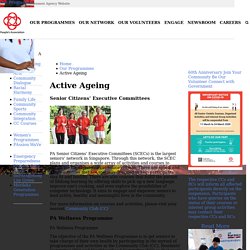
Through this network, the SCEC plans and organises a wide array of activities and courses to enrich the life experiences of senior citizens. There are sports and dance activities that are specially designed to help participants stay fit and healthy. There are also courses that fulfill the pursuit of lifelong learning by offering skills to pick up a new language, improve one's cooking, and even explore the possibilities of computer technology.
It aims to engage and empower seniors to lead active, healthy and meaningful lives in the community. For more information on courses and activities, please visit your nearest Community Club (CC). PA Wellness Programme The PA Wellness Programme offers those aged 50 and above opportunities to take part in activities to help them remain mentally, physically and socially active.